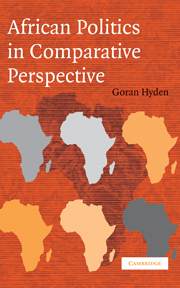Book contents
- Frontmatter
- Contents
- Acknowledgments
- 1 The Study of Politics and Africa
- 2 The Movement Legacy
- 3 The Problematic State
- 4 The Economy of Affection
- 5 Big Man Rule
- 6 The Policy Deficit
- 7 The Agrarian Question
- 8 Gender and Politics
- 9 Ethnicity and Conflict
- 10 The External Dimension
- 11 So What Do We Know?
- 12 Quo Vadis Africa?
- References
- Index
4 - The Economy of Affection
Published online by Cambridge University Press: 05 September 2012
- Frontmatter
- Contents
- Acknowledgments
- 1 The Study of Politics and Africa
- 2 The Movement Legacy
- 3 The Problematic State
- 4 The Economy of Affection
- 5 Big Man Rule
- 6 The Policy Deficit
- 7 The Agrarian Question
- 8 Gender and Politics
- 9 Ethnicity and Conflict
- 10 The External Dimension
- 11 So What Do We Know?
- 12 Quo Vadis Africa?
- References
- Index
Summary
The previous two chapters have suggested that relations of power in African countries are predominantly personal and in that sense, informal. They are not just indicative of odd behavior that goes contrary to formal authority. They are in fact the social structures that hold society together. As the discussion of the movement legacy indicated, agency occurs in the context of informal relations. The informal has been institutionalized to the point where it tends to dominate the way formal institutions operate. Formal rules, for instance, are often bent to serve informal institutions. The informal institutions are not unique to Africa, but their significance is particularly noticeable there. Nowhere else can they be studied more extensively than in African countries.
Because these institutions permeate social and political life, one can rightly speak of the presence of a fundamental social logic. This logic centers on direct, face-to-face reciprocities to get things done. Its core principles are that (a) whom you know is more important than what you know, (b) sharing personal wealth is more rewarding than investing in economic growth, and (c) a helping hand today generates returns tomorrow. Such is the essence of the informal political economy that I call the “economy of affection” (Hyden 1980).
This economy differs from capitalism as well as socialism. Money is not an end in itself, nor is the state the primary redistributive mechanism. It relies on the handshake rather than the contract, on personal discretion rather than official policy to allocate resources.
- Type
- Chapter
- Information
- African Politics in Comparative Perspective , pp. 72 - 93Publisher: Cambridge University PressPrint publication year: 2005
- 2
- Cited by

